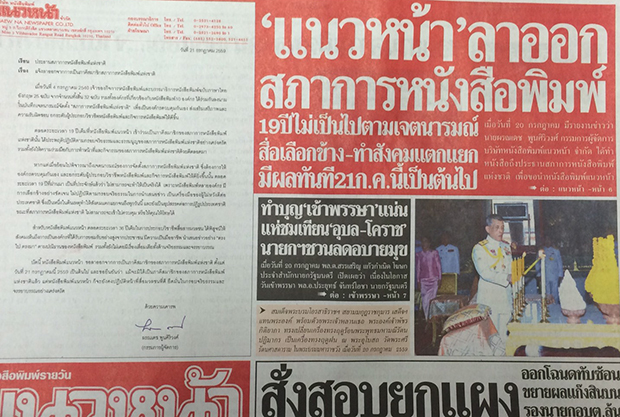
Naewna Newspaper Co, publisher of <i>Naewna</i> newspaper, has withdrawn from the National Press Council of Thailand, one of the country's four major media associations, citing the NPCT's inability to live up to the intentions declared when it was established in 1997.
The publisher said the council was ineffective in its stated intention of ensuring ethical and professional journalism, and that some members had become the tools of people causing conflict and division in society.
NPCT president Chavarong Limpattamapanee on Thursday rejected Naewna's assertion. The council was currently reviewing the code of conduct of newspapers to bring it up-to-date, he said.
- UPDATE: NPCT replies: Naewna pullout 'no big deal'
The newspaper announced on its website on Wednesday that Parondej Poonsiriwong, managing director of Naewna Newspaper Co, had sent a resignation letter to the NPCT president.
The letter stated that on July 4, 1997, publishers and editors of 25 Thai and English-language newspapers and 10 organisations related to news publication signed a memorandum of intention, establishing the NPCT to promote freedom, journalistic responsibility and ethics in the news industry.
Naewna, as a member of the NPCT for the past 19 years, had strictly followed the code of conduct and the constitution of the NCPT and fully cooperated in all of its activities, the letter said.
However it was evident that the NPCT had not been able to live up to its intentions of wanting newspapers to effectively keep each other under control in terms of ethics and professionalism.
Instead, some NPCT members had shown a lack of journalistic ethics in which people were clearly divided and newspapers were taking sides.
Naewna's resignation is effective from July 21.
Sources said Naewna was also considering resigning its membership of the Association of Online News Producers.
NPCT president Chavarong said it was the council's intention that members keep each other under control on a voluntary basis. A member newspaper could resign, as stipulated in the council's regulations and constitution.
However, he did not agree that the NPCT had not been able to fulfil its declared intentions.
Even without Naewna, more than 50 other newspapers in Bangkok and the provinces would continue to pursue the NPCT's intentions to enhance journalistic professionalism and the newspaper business, he said. Naewna's departure would not affect the NPCT's existence.
"The NPCT has amended its constitution to set up a committee to oversee the ethics of its members. The subcommittee for considering complaints has been upgraded to become the committee on ethics, to enable it to expedite its work and to go on the offensive and effectively control its members' ethical standards.
"We are in the process of reviewing the code of conduct of newspapers to bring it up-to-date. It is a pity that Naewna has resigned, thus abandoning an opportunity to further push for the fulfilment of the NPCT's intentions," said Mr Chavarong.